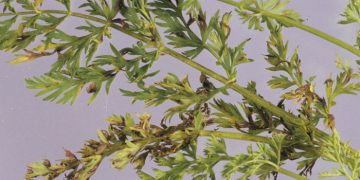#PlantDisease #FungalInfection #CropYields #PreventativeMeasures #Farmers #Gardeners #FoodSecurity #Fungicides #ChemicalTreatments #CropRotation #DiseaseResistance #LeafBlight
Leaf blight is a fungal disease that affects a wide range of plant species, including corn, wheat, and soybeans. It is caused by several different types of fungi and can lead to significant losses in crop yields if not treated properly. In this article, we will discuss the development of leaf blight, its symptoms, and the consequences of leaving it untreated. Additionally, we will explore some preventative measures that farmers and gardeners can take to reduce the risk of infection.
The development of leaf blight usually begins with the presence of fungal spores, which can be spread by wind, water, or insects. Once the spores come into contact with a suitable host, they can begin to germinate and invade the plant tissue. As the fungi grow, they produce a variety of toxins that can damage the plant’s leaves and stem. The symptoms of leaf blight can vary depending on the type of fungus involved, but typically include leaf spots, yellowing or browning of leaves, and wilting.
If left untreated, leaf blight can have serious consequences for farmers and gardeners. In addition to reducing crop yields, it can also make plants more susceptible to other diseases and pests. This can lead to further losses in the future and can have a significant impact on food security.
Fortunately, there are several preventative measures that can be taken to reduce the risk of leaf blight infection. These include using disease-resistant plant varieties, practicing crop rotation, and avoiding overhead watering. Additionally, applying fungicides and other chemical treatments can help to control the spread of the disease.
Leaf blight is a serious fungal disease that can have significant consequences for farmers and gardeners. Understanding its development and symptoms is crucial for effective treatment and prevention. By taking proactive steps to reduce the risk of infection, we can help to protect our crops and ensure a more sustainable food supply.































